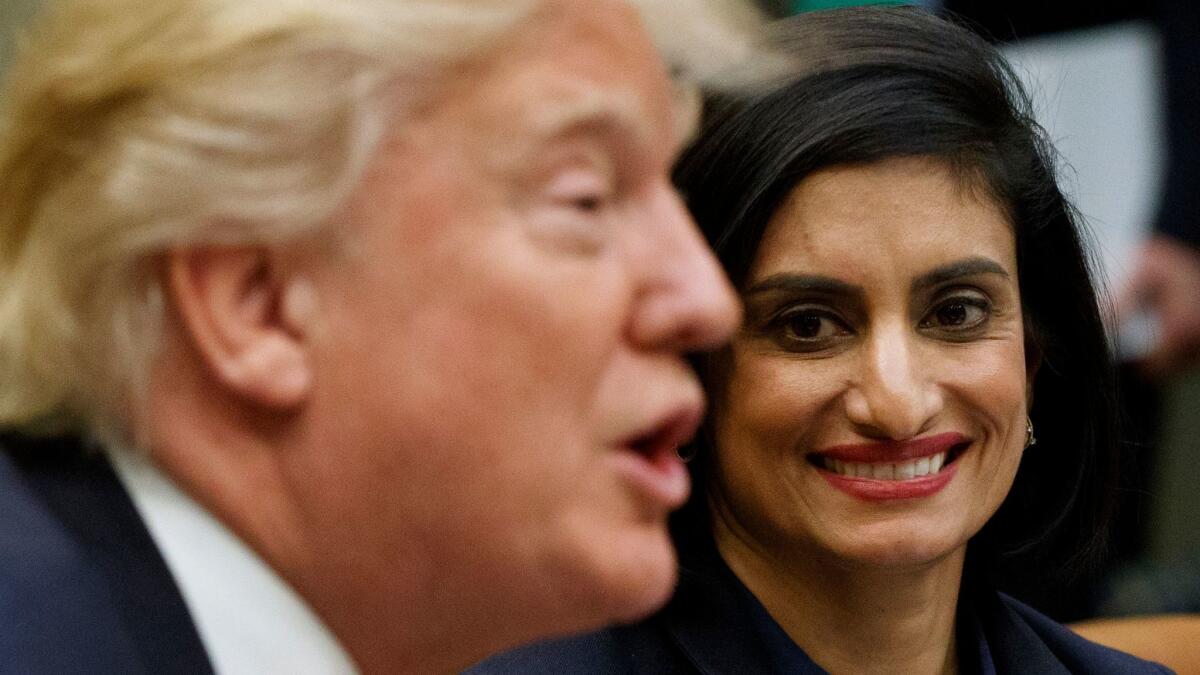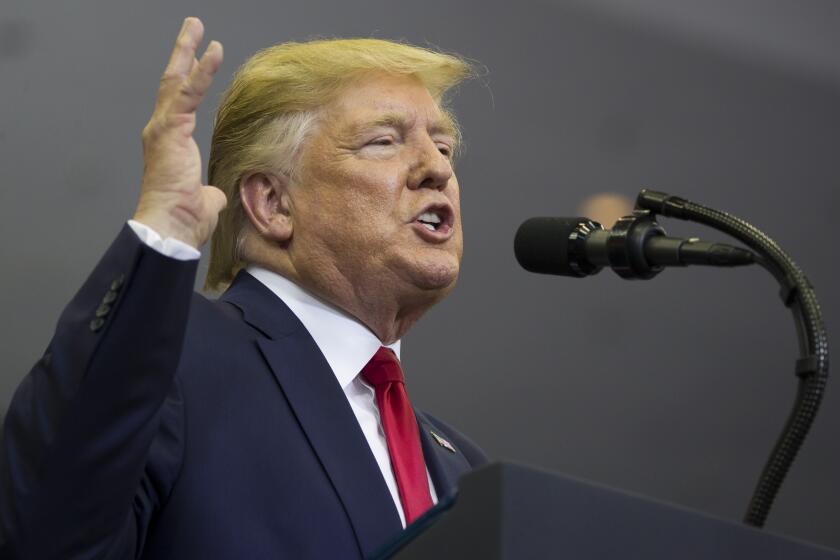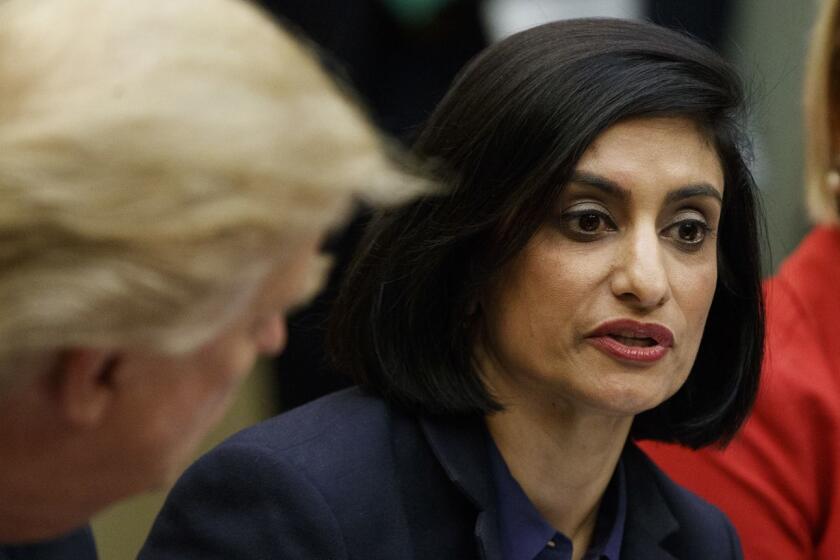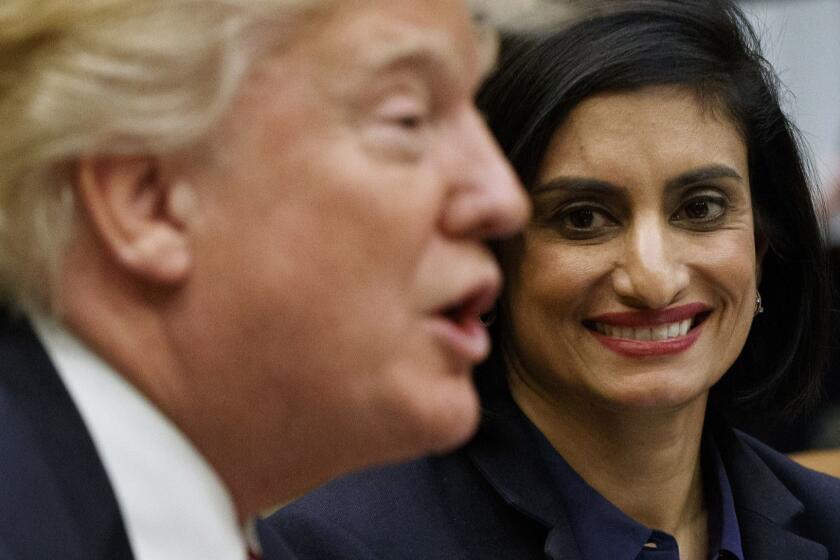Column: Trump launches sneaky 11th-hour attacks on clean air, Medicaid, LGBTQ people

- Share via
Evidently working on the principle that one shouldn’t let a crisis go to waste — even a crisis of one’s own making — the Trump administration has spent the last few days and weeks sneaking a passel of destructive last-minute regulations into federal law.
Among Trump’s targets are clean air rules, Medicaid and anti-discrimination protections for LGBTQ people and other vulnerable Americans.
Most if not all these initiatives are arriving with one foot, if not both feet, in the grave: They’re destined to be ignored or invalidated by the incoming Biden administration.
This is a lights-are-shutting-off, last-ditch, heading-out-the-door attempt to trip up climate action by the incoming administration.
— Julie McNamara, Union of Concerned Scientists, referring to a Trump attack on the Clean Air Act
But the sheer magnitude of the onslaught creates a problem in itself. Most of the new rules are subject to repeal under the Congressional Review Act, which allows for the reversal by both houses of Congress of regulations implemented in the waning months of a departing administration. But that will require a lot of votes.
“So many actions have come out of the Trump administration in the last few days and weeks that I don’t know that Congress would want to take up a ton of floor time,” Joanne Spalding, chief climate counsel for the Sierra Club, told me. “But floor time in Congress is really precious.”
Accordingly, she says, the Sierra Club may opt to go to court to overturn at least one Trump effort to roll back an environmental rule.
It’s hard to overstate the cynicism of Trump’s 11th-hour activity. Some of the rules being pushed through now, with only days left in his term, have been on his agenda for years but couldn’t previously be pushed over the finish line, whether because they were too controversial, lacked administrative foundation or for other reasons.
There are rules that were previously implemented and rejected by federal courts — in at least one case, twice before.
And some rules that are manifestly destined for the trash heap have been enacted largely to throw sand in the wheels of the Biden administration’s launch.
Trump’s defeat hasn’t slowed down his scorched-earth attack on American policy
We’ve written previously about Trump’s scorched-earth bequest to Biden’s economic program. He’s enlarged the battlefield since then. Let’s take a look at the most notable recent initiatives, by category.
Environmental protection
Dismantling the Clean Air Act: A rule made final Wednesday exempts a large number of stationary sources of air pollution (that is, sources other than vehicles) from clean air regulations.
The rule designates as “significant” polluters only those in categories deemed to contribute more than 3% of total U.S. greenhouse gas emissions. Experts say that this arbitrary threshold would chiefly cover only power plants, leaving oil and gas producers exempt from clean air oversight.
Indeed, the Environmental Protection Agency acknowledges that the rule is designed to immunize the “development of domestic energy resources” from environmental oversight.
“This is a lights-are-shutting-off, last-ditch, heading-out-the-door attempt to trip up climate action by the incoming administration,” says Julie McNamara of the Union of Concerned Scientists.
McNamara calls the 3% threshold an “invented metric” with no basis in science. The rule, she says, “violates so many rule-making requirements; but it does delay action by wasting time and resources, and that comes at a cost.”
The provision may be especially vulnerable to legal challenge because it was bootstrapped to a different regulatory proposal. The EPA never solicited public comment on the 3% standard, a baseline administrative requirement of any regulatory change of this magnitude.
False scientific “transparency”: On Jan. 3 the EPA made final a rule ostensibly designed to improve the “transparency” of the science underlying regulatory initiatives.
Say this for Scott Pruitt, the embattled administrator of the Environmental Protection Agency: He’s immune to irony.
As we’ve reported before, however, this rule is a wolf in sheep’s clothing — it actually would hobble the work of regulators. That’s why it has long been on the wish list of right-wing climate change deniers in Congress and the executive branch.
The rule would require regulatory agencies to downplay scientific research based on nonpublic data. Superficially, that sounds like a good thing. EPA Administrator Andrew Wheeler was counting on a purely superficial examination of the rule, as is evident from the Jan. 4 Wall Street Journal op-ed in which he announced it.
“Transparency is a defense of, not an attack on, the important work done by career scientists at the EPA,” Wheeler wrote. “By shining light on the science we use in decisions, we are helping to restore trust in government.”
It’s not that simple. The rule would limit reliance on research that uses private data such as medical records or proprietary research. That would complicate the use of epidemiological studies, which typically use such data, in assessing the health effects of pollution.
Expanded to other federal agencies, the rule would undermine health regulations — one former EPA staff member now in private legal practice has said that the rule would have prevented the Food and Drug Administration from approving the COVID vaccines.
Anti-science members of Congress tried and failed for years to legislate the rule. Former EPA Administrator Scott Pruitt tried to promulgate it in June 2018 but ran into pushback from the agency’s own independent science advisory board.
Wheeler tried to jam it through after he took over from Pruitt in February 2019 but was confronted with the same objections. Now, with everyone’s attention focused elsewhere, he succeeded.
Softening fuel efficiency penalties: For the third time, the Trump administration is issuing a rule to undermine the penalties levied on automakers that fall short of government fleet fuel efficiency standards. A federal appeals court in New York sent the administration packing the last two times. Third time isn’t likely to be the charm.
GM’s reversal on California auto emissions isn’t as laudable as it seems
The penalties were initially established in 1975 at the rate of $5 for every tenth of a mile per gallon by which an automaker’s vehicles fall below the required standard in any model year. The charge was raised to $5.50 in 1997 and $14 in 2016. That year it became subject to a new federal law requiring that statutory penalties henceforth be indexed to inflation.
In 2017, the Trump administration tried to delay the increase from $5.50 indefinitely. The move was slapped down by the federal court of appeals in New York in a lawsuit brought by California, three other states and three environmental groups, including the Sierra Club.
In 2019, the administration tried to simply roll back the penalty to $5.50. This time California, 13 other states, the Sierra Club and the Natural Resources Defense Council sued, and won before the same court
And now here they are again, now with an interim rule delaying the increase until 2022. “This is their third bite of the apple,” the Sierra Club’s Spalding says, “and it’s completely illegal.” She says her organization and other plaintiffs are girding to bring the issue back to court.
Medicaid and healthcare
Work rules and block grants: Medicaid, the public health program for indigent households, is second to none among government programs in the hostility it has attracted from the Trump administration. Virtually since Trump’s inauguration, he has taken steps aimed at throwing tens of thousands of Americans off the Medicaid rolls. In the last few months, those efforts have intensified.
The administration in October approved work requirements for Medicaid enrollees in two states, Georgia and Nebraska, despite a long record of such requirements being rejected by federal courts. Ample evidence exists, moreover, that work requirements don’t achieve either of the goals their proponents hold dear: They don’t reduce joblessness and they don’t improve people’s health.
On the contrary, they reduce enrollment, in part because they typically come with administrative requirements that low-income households can’t meet and that state bureaucracies can’t manage.
Why the Trump administration would continue drinking from this poisoned well in the face of legal and social disaster is a mystery. But its love for work rules remains robust; Seema Verma, administrator of the government’s Centers for Medicare and Medicaid Services and a prime promoter of this deplorable policy, seldom avoids a chance to be on hand for announcements of her agency’s approval of the rules.
Curiously, the Supreme Court decided last month to consider Medicaid work rules. The decision has healthcare advocates “scratching their heads,” says Sara Rosenbaum, a public health expert at George Washington University, because lower courts have been unanimous in overturning those rules.
GOP states are spending more to cover fewer residents on Medicaid, thanks to ideological stupidity.
Moreover, the court set a deadline for the federal government’s brief in the case of Jan. 19 — the day before the Trump administration becomes the Biden administration — which is certain to stifle the work-requirement craze for good.
On Jan. 8, Verma’s agency also approved a Medicaid block grant for Tennessee. As we’ve reported, block grants merely set state Medicaid programs up for budget cuts. The Trump administration crows that block grants would provide states more “flexibility” in designing their Medicaid programs, but the truth is exactly the opposite.
Traditional Medicaid provides a partial federal reimbursement for anything a state spends on its Medicaid population. That allows the program to adjust for healthcare shocks — for example, a COVID-19 pandemic. Block grants place a cap on the federal share.
If a state starts to incur rising costs, too bad — it will have to cover the cost from its own coffers, or cut enrollment or benefits to keep within its budget. Block grant arrangements also allow states to pocket whatever it doesn’t spend on Medicaid, with no requirement that it spend the surplus on the Medicaid population. That’s an incentive for state officials to cut Medicaid, even to the bone.
The government’s grant of a waiver allowing Tennessee to turn its program into a block grant also allows the state to pare the list of prescription drugs that can be provided to Medicaid enrollees. That’s a departure from the federal rule requiring that Medicaid provide any drug approved by the FDA.
The changes make healthcare advocates very nervous. “The authorities granted through this waiver will likely result in a reduction in enrollment, limiting of benefits and services and other changes that will decrease access to care for some of Tennessee’s most vulnerable residents,” says Lisa Lacasse, president of the advocacy arm of the American Cancer Society.
Seema Verma, the federal official in charge of Medicare, Medicaid and the Affordable Care Act, has blasted into the limelight. And not in a good way.
Hamstringing Biden health reform: In another initiative, Verma’s agency has been trying to get states with Medicaid demonstration projects — including work rules — to sign documents limiting the federal government’s right to end those projects if they’re shown not to work.
Under those documents’ terms, Rosenbaum says, the administration would not be able to unilaterally terminate the demonstrations. “They’d have to go through a lengthy procedural process to do so,” she says. “That’s wholly unjustified under the department’s own rules. They gave nobody any chance to comment. This is a piece of policy-making, and they should have given the public a chance to see it and comment on it.”
Anti-discrimination
LGBTQ protections: The Department of Health and Human Services bulled ahead Wednesday with a final rule weakening anti-discrimination protection for LGBTQ people in federal health and social services programs. The rule allows agencies to give religious concerns greater weight in deciding whether or how to serve those enrollees. As congressional Democrats noted, expanding religious exemptions “will eviscerate uniform nondiscrimination protections that apply to all HHS programs.... with potentially dangerous consequences for the Americans we represent.”
This administration initiative has been kicking around for more than a year. Anti-discrimination advocates have been warning about its potential effect all along. There’s no logical reason for Health and Human Services to make it final now, in the week before the Trump administration ends, since it’s more than likely that the Biden administration will be expanding LGBTQ protections, not shrinking them. But now there’s just one more obstacle they’ll have to climb over to do so.
That just brings the Trump scorched-earth program up to the last week of the Trump presidential era. As we write, there are several more days to go. To paraphrase Bette Davis’ Margo Channing in the movie “All About Eve”: “Fasten your seat belts. It’s going to be a bumpy ride.”
More to Read
Inside the business of entertainment
The Wide Shot brings you news, analysis and insights on everything from streaming wars to production — and what it all means for the future.
You may occasionally receive promotional content from the Los Angeles Times.















